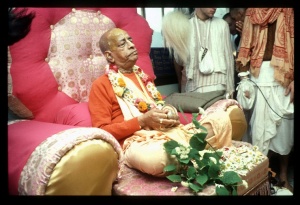SB 1.4.14: Difference between revisions
m (1 revision(s)) |
(Vanibot #0054 edit - transform synonyms into clickable links, which search similar occurrences) |
||
| (One intermediate revision by one other user not shown) | |||
| Line 1: | Line 1: | ||
{{info | {{info | ||
|speaker= | |speaker=Sūta Gosvāmī | ||
|listener=Sages of | |listener=Sages of Naimiṣāraṇya | ||
}} | }} | ||
[[Category:Srimad-Bhagavatam - Canto 01 Chapter 04]] | |||
[[Category:Bhagavatam Verses Spoken by Suta Gosvami - Vanisource|010414]] | |||
<div style="float:left">'''[[Srimad-Bhagavatam]] - [[SB 1|First Canto]] - [[SB 1.4: The Appearance of Sri Narada|Chapter 4: The Appearance of Śrī Nārada]]'''</div> | |||
<div style="float:right">[[File:Go-previous.png|link=SB 1.4.13]] '''[[SB 1.4.13]] - [[SB 1.4.15]]''' [[File:Go-next.png|link=SB 1.4.15]]</div> | |||
{{CompareVersions|SB|1.4.14|SB 1962|SB 1972-77}} | |||
{{RandomImage}} | |||
==== TEXT 14 ==== | ==== TEXT 14 ==== | ||
<div | <div class="verse"> | ||
sūta uvāca | :sūta uvāca | ||
dvāpare samanuprāpte | :dvāpare samanuprāpte | ||
tṛtīye yuga-paryaye | :tṛtīye yuga-paryaye | ||
jātaḥ parāśarād yogī | :jātaḥ parāśarād yogī | ||
vāsavyāṁ kalayā hareḥ | :vāsavyāṁ kalayā hareḥ | ||
</div> | </div> | ||
| Line 18: | Line 24: | ||
==== SYNONYMS ==== | ==== SYNONYMS ==== | ||
<div | <div class="synonyms"> | ||
''[//vanipedia.org/wiki/Special:VaniSearch?s=sūtaḥ&tab=syno_o&ds=1 sūtaḥ]'' — Sūta Gosvāmī; ''[//vanipedia.org/wiki/Special:VaniSearch?s=uvāca&tab=syno_o&ds=1 uvāca]'' — said; ''[//vanipedia.org/wiki/Special:VaniSearch?s=dvāpare&tab=syno_o&ds=1 dvāpare]'' — in the second millennium; ''[//vanipedia.org/wiki/Special:VaniSearch?s=samanuprāpte&tab=syno_o&ds=1 samanuprāpte]'' — on the advent of; ''[//vanipedia.org/wiki/Special:VaniSearch?s=tṛtīye&tab=syno_o&ds=1 tṛtīye]'' — third; ''[//vanipedia.org/wiki/Special:VaniSearch?s=yuga&tab=syno_o&ds=1 yuga]'' — millennium; ''[//vanipedia.org/wiki/Special:VaniSearch?s=paryaye&tab=syno_o&ds=1 paryaye]'' — in the place of; ''[//vanipedia.org/wiki/Special:VaniSearch?s=jātaḥ&tab=syno_o&ds=1 jātaḥ]'' — was begotten; ''[//vanipedia.org/wiki/Special:VaniSearch?s=parāśarāt&tab=syno_o&ds=1 parāśarāt]'' — by Parāśara; ''[//vanipedia.org/wiki/Special:VaniSearch?s=yogī&tab=syno_o&ds=1 yogī]'' — the great sage; ''[//vanipedia.org/wiki/Special:VaniSearch?s=vāsavyām&tab=syno_o&ds=1 vāsavyām]'' — in the womb of the daughter of Vasu; ''[//vanipedia.org/wiki/Special:VaniSearch?s=kalayā&tab=syno_o&ds=1 kalayā]'' — in the plenary portion; ''[//vanipedia.org/wiki/Special:VaniSearch?s=hareḥ&tab=syno_o&ds=1 hareḥ]'' — of the Personality of Godhead. | |||
</div> | </div> | ||
| Line 25: | Line 31: | ||
==== TRANSLATION ==== | ==== TRANSLATION ==== | ||
<div | <div class="translation"> | ||
Sūta Gosvāmī said: When the second millennium overlapped the third, the great sage [Vyāsadeva] was born to Parāśara in the womb of Satyavatī, the daughter of Vasu. | Sūta Gosvāmī said: When the second millennium overlapped the third, the great sage [Vyāsadeva] was born to Parāśara in the womb of Satyavatī, the daughter of Vasu. | ||
</div> | </div> | ||
| Line 32: | Line 38: | ||
==== PURPORT ==== | ==== PURPORT ==== | ||
<div | <div class="purport"> | ||
There is a chronological order of the four millenniums, namely Satya, Dvāpara, Tretā and Kali. But sometimes there is overlapping. During the regime of Vaivasvata Manu, there was an overlapping of the twenty-eighth round of the four millenniums, and the third millennium appeared prior to the second. In that particular millennium, Lord Śrī Kṛṣṇa also descends, and because of this there was some particular alteration. The mother of the great sage was Satyavatī the daughter of the Vasu (fisherman), and the father was the great Parāśara Muni. That is the history of Vyāsadeva's birth. Every millennium is divided into three periods, and each period is called a sandhyā. Vyāsadeva appeared in the third sandhyā of that particular age. | There is a chronological order of the four millenniums, namely Satya, Dvāpara, Tretā and Kali. But sometimes there is overlapping. During the regime of Vaivasvata Manu, there was an overlapping of the twenty-eighth round of the four millenniums, and the third millennium appeared prior to the second. In that particular millennium, Lord Śrī Kṛṣṇa also descends, and because of this there was some particular alteration. The mother of the great sage was Satyavatī the daughter of the Vasu (fisherman), and the father was the great Parāśara Muni. That is the history of Vyāsadeva's birth. Every millennium is divided into three periods, and each period is called a ''sandhyā''. Vyāsadeva appeared in the third ''sandhyā'' of that particular age. | ||
</div> | </div> | ||
__NOTOC__ | |||
<div style="float:right; clear:both;">[[File:Go-previous.png|link=SB 1.4.13]] '''[[SB 1.4.13]] - [[SB 1.4.15]]''' [[File:Go-next.png|link=SB 1.4.15]]</div> | |||
__NOTOC__ | |||
__NOEDITSECTION__ | |||
Latest revision as of 18:09, 17 February 2024

A.C. Bhaktivedanta Swami Prabhupada
TEXT 14
- sūta uvāca
- dvāpare samanuprāpte
- tṛtīye yuga-paryaye
- jātaḥ parāśarād yogī
- vāsavyāṁ kalayā hareḥ
SYNONYMS
sūtaḥ — Sūta Gosvāmī; uvāca — said; dvāpare — in the second millennium; samanuprāpte — on the advent of; tṛtīye — third; yuga — millennium; paryaye — in the place of; jātaḥ — was begotten; parāśarāt — by Parāśara; yogī — the great sage; vāsavyām — in the womb of the daughter of Vasu; kalayā — in the plenary portion; hareḥ — of the Personality of Godhead.
TRANSLATION
Sūta Gosvāmī said: When the second millennium overlapped the third, the great sage [Vyāsadeva] was born to Parāśara in the womb of Satyavatī, the daughter of Vasu.
PURPORT
There is a chronological order of the four millenniums, namely Satya, Dvāpara, Tretā and Kali. But sometimes there is overlapping. During the regime of Vaivasvata Manu, there was an overlapping of the twenty-eighth round of the four millenniums, and the third millennium appeared prior to the second. In that particular millennium, Lord Śrī Kṛṣṇa also descends, and because of this there was some particular alteration. The mother of the great sage was Satyavatī the daughter of the Vasu (fisherman), and the father was the great Parāśara Muni. That is the history of Vyāsadeva's birth. Every millennium is divided into three periods, and each period is called a sandhyā. Vyāsadeva appeared in the third sandhyā of that particular age.